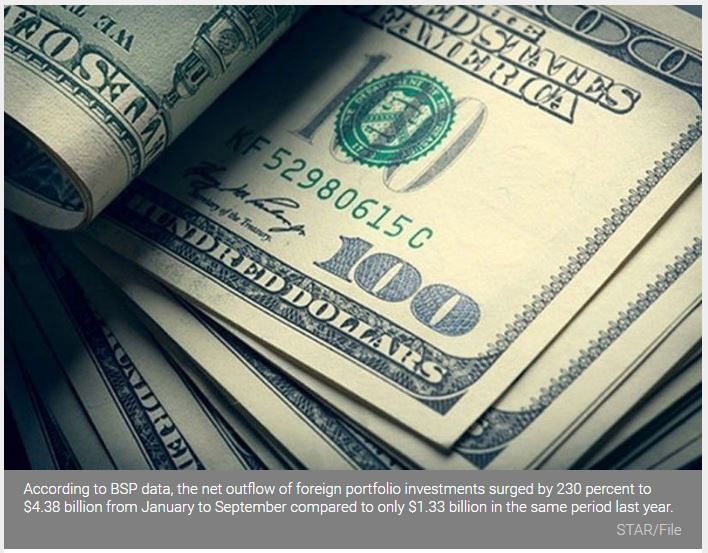Philippines: Net hot money outflow hits $4.4 billion in 9 months
MANILA, Philippines — Foreign fund managers continued to pull out their speculative funds or hot money from the Philippines for the seventh straight month in September amid the uncertainties brought about by the pandemic, the Bangko Sentral ng Pilipinas (BSP) said yesterday.
According to BSP data, the net outflow of foreign portfolio investments surged by 230 percent to $4.38 billion from January to September compared to only $1.33 billion in the same period last year.
“This is larger compared to the $1.3 billion net outflows noted for the same period last year brought about by uncertainties due, among others, to the ongoing impact of the COVID-19 pandemic to the global economy and financial system,” the BSP said.
The BSP also cited international and domestic developments such as geopolitical tensions, certain corporate governance issues and extended quarantine measures in select regions in the country.
Transactions involving securities listed in the Philippine Stock Exchange (PSE), peso government securities, and other investments all yielded net outflows during the nine-month period, the BSP said.
Gross inflows plunged by 41 percent to $7.68 billion during the nine-month period from $13.04 billion a year ago, while gross outflows declined by 16 percent to $12.06 billion from $14.37 billion.
Speculative investors continued to skip the Philippines amid the general risk off sentiment in the markets, prompting them to fly to haven countries. Foreign investors continued to liquidate portfolios and keep money in cash due to heightened worries over adverse economic impact of the coronavirus pandemic.
For September alone, the BSP said the net outflow of foreign portfolio investments more than doubled to $493.65 million from $231.71 million in the same month last year. This was the biggest net outflow since the $1 billion recorded in May.
The Philippines has been recording a net outflow in speculative funds since March as the entire Luzon was placed under enhanced community quarantine to curb the spread of the virus.
As a result, the economy stalled and the country slipped into recession as the gross domestic product (GDP) contracted by a record 16.5 percent in the second quarter.
Gross inflows in September plummeted by nearly 55 percent to $594.02 million from $1.3 billion. Top investor countries, which accounted for nearly 83 percent of total are the United Kingdom, US, Luxemburg, and Switzerland
About 92.5 percent of the total inflows went to PSE-listed securities particularly holding firms, property companies, food, beverage and tobacco firms, banks as well as retail companies.
The remaining 7.5 percent of the inflows last month went to peso government securities.
On the other hand, gross outflows declined by 29 percent to $1.09 billion in September from $1.53 billion in the same month last year. The US received 61 percent of the total outflows last month.
Rizal Commercial Banking Corp. chief economist Michael Ricafort said the local financial markets mostly experienced healthy profit-taking in September after gains in the previous months amid still near record low interest rate benchmarks yields and some liquidity-driven gains amid the continued increase in excess liquidity in the financial system largely brought about by various monetary easing and other liquidity infusion measures by the BSP.
“Going forward, any sustained reduction/tapering off in new COVID-19 cases and any succcessful development and deployment of vaccines would also help economic recovery prospects gain further traction that help improve investment valuations as well as also help improve the net foreign portfolio investments data,” Ricafort said.
According to the BSP, the inflow of net foreign portfolio investments may plunge by 68 percent to $2.4 billion this year from $7.5 billion last year before recovering to $3.5 billion next year.
Source: https://www.philstar.com/business/2020/10/30/2053246/net-hot-money-outflow-hits-44-billion-9-months


 English
English




